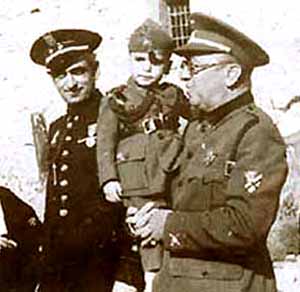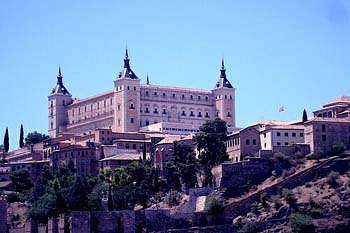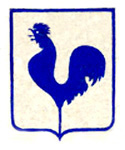 |
 |
Stories & Legends
The Siege of the Alcazar in Toledo
Margaret Galitzin
One of the most celebrated episodes in the Spanish Civil War took place in the Summer of 1936 during the defense of Toledo. The governor of Toledo was Colonel José Moscardó Ituarte, who had under his command about 1,300 guards that included both monarchists (Carlists) and nationalists (Falangists). The main point of resistance of the city was its castle-fortress called Alcázar of Toledo. The pro-communist Republican army - much more numerous than Moscardó’s garrison - began their siege on July 21, and it ended on September 27.

Colonel Moscardo refused to surrender the Alcazar at the cost of his son's life. Above, after the siege with a younger son |
Colonel Moscardó, a good Catholic, was holding the Alcázar, a stone fortification in the highest part of Toledo, the old residence of the Spanish monarchs. It was an important strategic point and a point of honor for the monarchist-nationalist coalition. Losing it would have been a serious blow to morale.
The siege began on July 21 with heavy artillery bombardment. From Madrid members of the Republican government - the minister of education, the minister of war, and General Riquelme - had been insistently telephoning Moscardó in an attempt to persuade him to surrender.
Finally, on July 23, Cándido Cabello, a Republican barrister in Toledo, telephoned Moscardó to say that if he did not surrender the Alcázar within 10 minutes, he would shoot Luis Moscardó, the Colonel’s 24-year-old son, whom he had captured that morning.
“So that you see what I say is true, he will speak to you,” said Cabello.
“What is happening, my son?” asked the Colonel.
“Nothing,” answered Luis, “They say they will shoot me if the Alcázar does not surrender.”
“If this is true,” replied Moscardo, “then commend your soul to God, shout Viva España, and die like a hero. Good-bye, my son.”
“That I can do,” answered Luis, “Good-bye, my father.”

The fortress of Alcazar, heavily damaged during the siege, was rebuilt after the war |
Cabello came back on to the telephone, and Moscardó told him, “The Alcazar will never surrender,” and replaced the receiver. The Reds later executed his son.
When called upon to give his report for the day, Moscardó gave his famous reply, "Sin novedad” [Nothing new].
Finally, in mid-September the Communists were able to tunnel beneath the thick walls of the Alcazar and plant a large explosive charge, which they detonated in a massive blast, bringing down a section of the wall. With this, they gained partial entry into the fortress, and intense fighting progressed. As the situation became desperate, a large relief force arrived and the Republican troops fell back in disorder. The siege ended with a victory of the monarchist-nationalist colligation.
This Siege of Alcazar was a highly symbolic victory in Toledo in the opening stages of the Spanish Civil War, and the episode of Colonel Moscardó and his son became a symbol of the Spanish militant spirit. After the war, the Alcazar was rebuilt, and in it today the telephone where the famous conversation between Colonel Moscardó and his son still remains on display.

This account is adapted from Max Hastings,
The Oxford Book of Military Anecdotes
Posted September 5, 2009


Related Topics of Interest
 Blessed Pedro Rodrigues, Knight of St. James Blessed Pedro Rodrigues, Knight of St. James
 A Speech by Charlemagne to His Nobles A Speech by Charlemagne to His Nobles
 Sultan Saladin Describes the Crusaders Sultan Saladin Describes the Crusaders
 Ranulf of Chester Ranulf of Chester
 The Divided Horsecloth The Divided Horsecloth
 Vocations of the European Peoples Vocations of the European Peoples
 Understanding the Crusades Understanding the Crusades

Related Works of Interest
|
|
Legends | Religious | Home | Books | CDs | Search | Contact Us | Donate

© 2002-
Tradition in Action, Inc. All Rights Reserved
|
 |
|